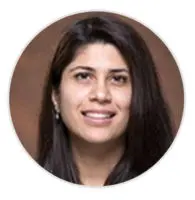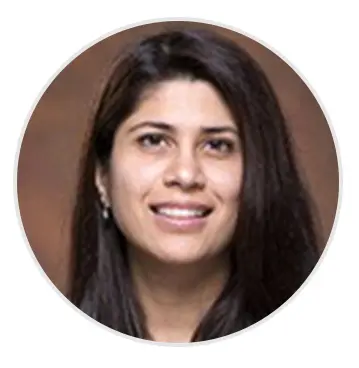Researcher Spotlight: Reem Karmali, MD, MS
Rush University
 Dr. Karmali is an Assistant Professor at Rush University Medical Center. Her LRF Clinical Research Mentoring Program (LCRMP) project investigates a process known as cancer cachexia, a metabolic syndrome that causes the loss of muscle mass and occasionally fat tissue in cancer patients. In aggressive B-cell non-Hodgkin lymphomas (B-NHL), cachexia has a demonstrated association with poor clinical outcomes. Dr. Karmali’s project seeks to measure changes in muscle mass and fatty tissue in a group of aggressive B-NHL patients, comparing their change in muscle mass to their survival rates, and identifying proteins circulating in the blood that are associated with cachexia. “With this, we anticipate revealing previously unappreciated processes in cancer cachexia that may lead to better treatment strategies and new treatment options for patients with aggressive B-cell lymphoma that may provide a greater chance of cure,” she says.
Dr. Karmali is an Assistant Professor at Rush University Medical Center. Her LRF Clinical Research Mentoring Program (LCRMP) project investigates a process known as cancer cachexia, a metabolic syndrome that causes the loss of muscle mass and occasionally fat tissue in cancer patients. In aggressive B-cell non-Hodgkin lymphomas (B-NHL), cachexia has a demonstrated association with poor clinical outcomes. Dr. Karmali’s project seeks to measure changes in muscle mass and fatty tissue in a group of aggressive B-NHL patients, comparing their change in muscle mass to their survival rates, and identifying proteins circulating in the blood that are associated with cachexia. “With this, we anticipate revealing previously unappreciated processes in cancer cachexia that may lead to better treatment strategies and new treatment options for patients with aggressive B-cell lymphoma that may provide a greater chance of cure,” she says.
After completing her MD at the University of Western Ontario, Dr. Karmali joined Rush University Medical Center to complete her residency and fellowship, as well as an MS in clinical research. During her studies, she witnessed the rapid evolution of the understanding of lymphoma biology as well as its translation to clinical practice in the approval of new novel therapies. “I have had the opportunity to administer these agents in patients who typically would not have had any other options for progressing disease and see a significant response and impact on quality of life,” she notes. “This has largely played a role in my decision to specialize in lymphoma and pursue a career in clinical research with a focus on identifying novel targets for drug design and development.” A long time participant in LRF’s Chicago Lymphoma Rounds professional education program even before her selection as an LRF Scholar, Dr. Karmali hopes that her participation in the LCRMP will help her refine her knowledge of and skills in clinical research design in order to obtain higher level funding and advance her career. “Additionally, I expect that this experience with the foundation will provide a venue to build strong and long-lasting mentoring relationships and foster ongoing research collaborations among colleagues in the field.”
Dr. Karmali says it is her patients who provide her with inspiration in her commitment to lymphoma research. “I have seen first-hand the positive impact novel targeted drugs have had on length and quality of life in patients. But, I have also seen patients succumb to their disease because of no additional options, with families rallying to collect funds to contribute to lymphoma research so that others may not suffer the same fate,” she says. “This motivates and inspires me to strive to contribute in some way that may add to our understanding of lymphoma biology and ultimately impact the outcomes of our patients.”


